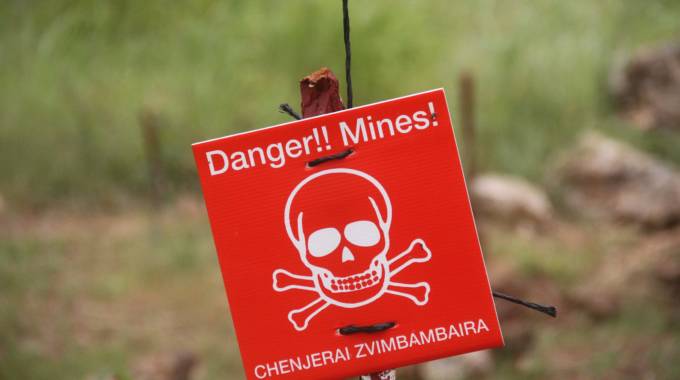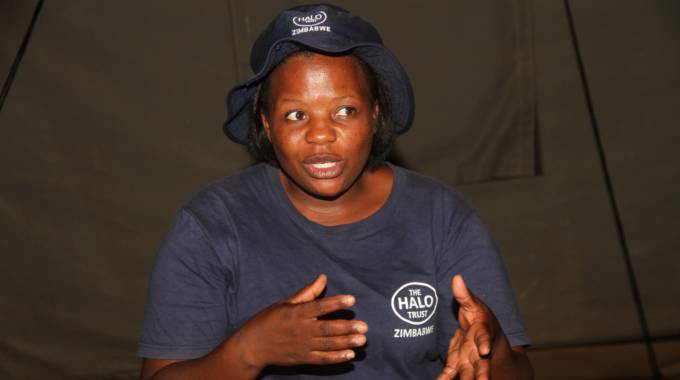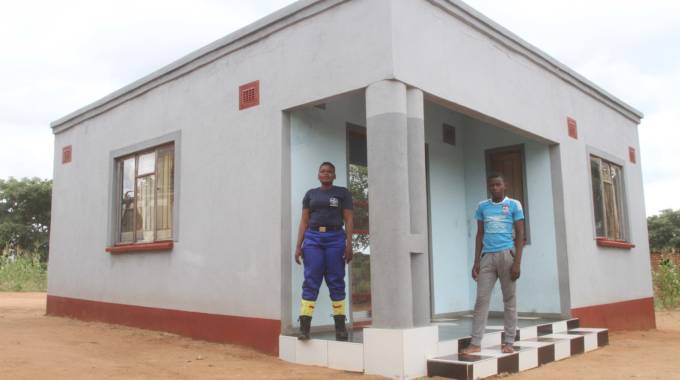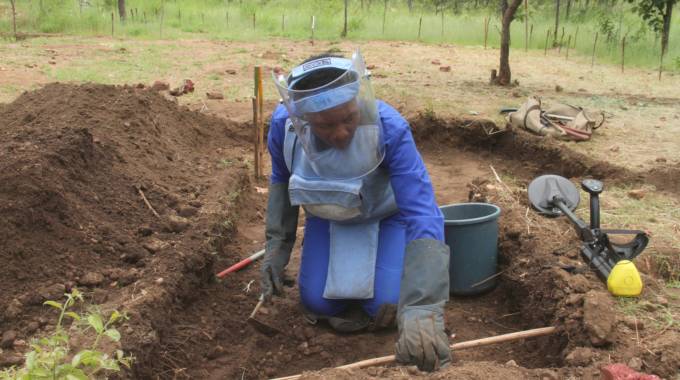
The Sunday Mail

Veronica Gwaze
WATCHING them going about their daily duties tells a story of tough and daring women with an unflinching desire to take on even the most dangerous tasks in a largely male-dominated field.
Such is their bravery that they wake up every day to labour in landmine infested fields, seemingly oblivious to the risks and dangers that surround them.
Landmines are among the most barbaric weapons of war which continue to kill and maim the innocent long after the conflicts have ended.

Four decades after Independence, dense and unfenced landmine belts that were laid by the Rhodesian army along the country’s borders with Zambia and Mozambique continue to cause harm.
Lives, livestock and limbs are lost almost daily. However, it is not all gloomy.
HALO Trust, an organisation largely working in war-torn communities, is recovering the landmines and making the land safe.
The organisation is involved in landmine clearance in at least 150 countries across the globe. To date, working in partnership with Government, they have removed more than 142 000 landmines from 15,7 million square metres of land in Zimbabwe.
A further 3,7 million square metres still await clearance. Interestingly, women are at the core of their operations as they value gender parity.
Out of their 405 skilled field staff members, 97 are women.
The Sunday Mail Society visited various minefields in Rushinga last week where some of the women shared their experiences.
Resilience
One of the most touching tales is that of 36-year-old Angeline Chioko.

Born in Mukumbura, she became one of the first five females to join the landmine clearance programme under HALO Trust in 2016.
Her rough experience and resilience has turned her into a shining beacon.
Chioko was thrust into the deep end at a tender age following the untimely demise of her father when she was in Form Two.
She immediately dropped out of school to search for work in Harare since she could no longer afford fees.
At 16, she was already a housemaid and worked in the northern suburbs of Highlands and Borrowdale.
“Ordinarily, that is a school-going age and one should be home with parents. I did not have the privilege to do so due to the terrible situation I found myself in at home,” recalls Chioko.
Her abusive marriage to a gold panner at the age of 18 did not last.
However, it left her a single mother of three.
“I went through hell. He always found reason to leave me nursing all sorts of injuries.
“One day I gathered courage and left for my parents’ place where I then got a job as a storekeeper,” she said.
Lady luck finally smiled on her in 2015 following several years of struggle as she secured employment as a de-miner.
Together with four other ladies, she was deployed to Nyakatondo base in Mt Darwin where they underwent rigorous training.
“It was not easy but because of the situation at home, quitting was never an option,” recounts Chioko.
Her first day in the minefield, she said, was nerve-wrecking. But she gradually warmed up and began to fall in love with the job. However, her new-found confidence was partially reversed a year later.
“I heard a loud explosion, which forced me to down my tools as my heart throbbed. I then heard my supervisor calling me for assistance. When I got to the scene, I discovered it was my friend. We were both shaken although the injury was not serious. We took her to Karanda Mission Hospital,” narrated Chioko.
Naturally, she wanted to quit upon returning to camp the following day.
But they were offered crucial counselling which helped restore her confidence.
Nonetheless, Chioko’s mother was not amused when she heard about the accident and sought to make her quit.
“The incident made me stronger and perfected my trade skill,” she said.
Chioko was promoted in her first year of service, July 2016 to be precise, and became a section commander.
Through her excellent service and determination, she was again promoted to become the first female supervisor — a position she holds to date.
She leads a division of about 30 people.
“It is not tough commanding a battalion due to my gender because we have mutual respect for each other,” said Chioko.
Betrayal, Agony, Joy
Ever Magunda shares an almost similar tale with Chioko. After losing both parents at a very tender age, she had to move in with her uncle and aunt.

Ever Magunda and her son Vincent Chimwara stand outside their three-bedroom house
And that marked the beginning of her sorrowful tale. “I was forced to drop out of school when I was in Grade Seven. This was despite the fact that I was on a Basic Education Assistance Module (BEAM) grant. My aunt and uncle argued that a girl could not go beyond primary school level,” she said.
BEAM officials tried in vain to sweet-talk her guardians to reconsider their position.
Instead, they forcibly married her off at 16.
Initially, the marriage appeared blissful before it morphed into a union of horror.
Physical and mental abuse became the order of the day.
But one day the husband abandoned the matrimonial home and later remarried.
Her in-laws knew everything, but kept Magunda in the dark even when she confronted them.
She, however, later discovered that her husband and the new wife were living with his parents. “I was heartbroken and left for my uncle’s place with our two children.”
After years of surviving on piece jobs, she got formally employed by HALO Trust in 2016. Initially, she joined as a chef.
Impressed by her peers’ work in making the environment safe, she went on to join the de-mining team two years later.
She now owns a neat, modern and well-furnished home that stands out in the village where they are based.
Every time she leaves for duty, Magunda prays for safety. “I knew what I was getting myself into when I became a de-miner. I had to be brave and adhere to safe operating procedures,” she said.
Having acquired vast knowledge around landmines, Magunda also takes time to enlighten fellow villagers on staying safe in danger zones.
She urged women to stop limiting themselves and consider taking up even risky and menial roles to provide for their families.
Selflessness
For some, taking the risky job has been inspired by a desire to assist others.
One such character is Batsirai Chinhema.
She is taking care of an extended family that includes her two children and six others from her struggling siblings.
“All I wanted was to provide for my family so even when I got on to the minefield, I was not scared at all,” revealed Chinhema.
“When my siblings got to understand the nature of my work, they tried to dissuade me. However, it did not work.”
They now support her.
In fact, her sister has since joined the organisation and they are in the same team.
Chinhema is now a revered role model in her community.
Apart from her formal work, she is also setting up a huge fish farming project.
“I believe what men can do, women can also, what we simply need is bravery.”
Her colleague Beauty Nyamande weighs in.
“I am the first born in a family six and had to become a ‘parent’ following the death of my father in 2003,” she said.
Nyamande joined the demining organisation in the same year as her colleagues but as part of the second recruitment batch.
Having witnessed a number of landmine accidents in her village, she understood the nature of the job.
“Most women were scared but I told myself that I was going to do it for my family. I had to be there for them,” said Nyamande.
She has over the years risen through the ranks and currently holds the position of section commander.
“At first I was reserved, especially around male subordinates but now I have moved out of my cocoon. I have gained experience by the day.
“I know when and how to put my foot down even when dealing with male subordinates,” said Nyamande.
Miriam Nyemba, a widow, said the task becomes easy when you remove your first landmine.

“I heard HALO Trust was recruiting in the village and I decided to go for it despite knowing fully well how dangerous landmines were,” she said.
“Initially it was tough but after removing my first landmine, it gave me confidence and courage to do it every day.
“When I got my first landmine, my heart skipped a bit and I shivered, but after that, I was more confident and eager to make the community safe for everyone,” she said.
As a parent, Nyemba said, you prioritise your children’s safety and that is what gives me the zeal to face each day on the field.
HALO Trust, in conjunction with Cassim’s Prosthetics, currently supports amputees who lost limbs to landmine accidents.
They also provide communities with landmine risk education.



